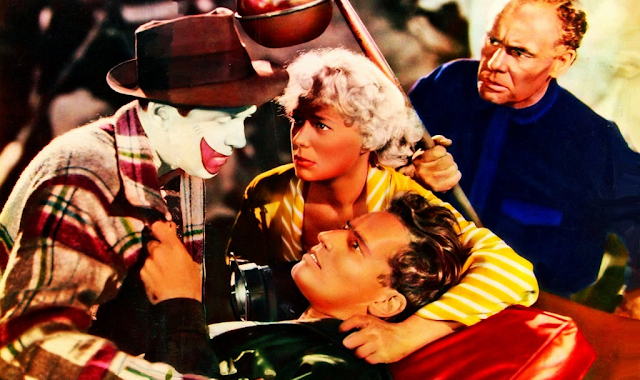The Greatest Show on Earth (1952)
Cecil B. DeMille's "The Greatest Show on Earth"
The phrase "the show mush go on" is often used to indicate the lasting nature of entertainment. It also demonstrates the entertainment industry's lack of loyalty to any one performer, as they are not as important as the 'show' itself. No illustration of these points are more explored on film than Cecil B. DeMille's "The Greatest Show on Earth."
The film centers around a circus troupe and the varying experience of the individuals of which it is comprised. What DeMille is able to narrative articulate with his direction of the film is the unique distinction between the individual and the entertainment venture as a whole. Throughout the film, the various characters each have their own unique life and problems. Aerialist Holly becomes jealous over being removed from center ring in place of the Great Sebastian. The Great Sebastian must deal with a horrible injury that threatens his entire career. Buttons the Clown, played by the enormously popular Jimmy Stewart, is hiding his identity behind his clown makeup to evade capture from police. Angel, who performs with elephants, must deal with a a jealous former lover who is pathological. And finally, Brad, played by Charleston Heston, who is the general manger of the circus, must wrangle these varying characters and their problems so that the show can be performed, regardless of circumstance.
After watching the film, it seemed to me that "The Greatest Show on Earth" was a fitting penultimate film for the legendary Mr. DeMille. I feel as though the Charleston Heston character of Brad (the manager) seems to represent DeMille. The circus is full of entertainment for audiences far and wide and more importantly, it's spectacle. And just like the circus manager, it is the director's job to ensure the spectacle continues and excites. Not only that, the director must wrangle a group of individuals together to produce a singular vision. This is why the film seems like a perfect venture for DeMille and a marvelous reflection on his career and his relationship with show business.




Comments
Post a Comment